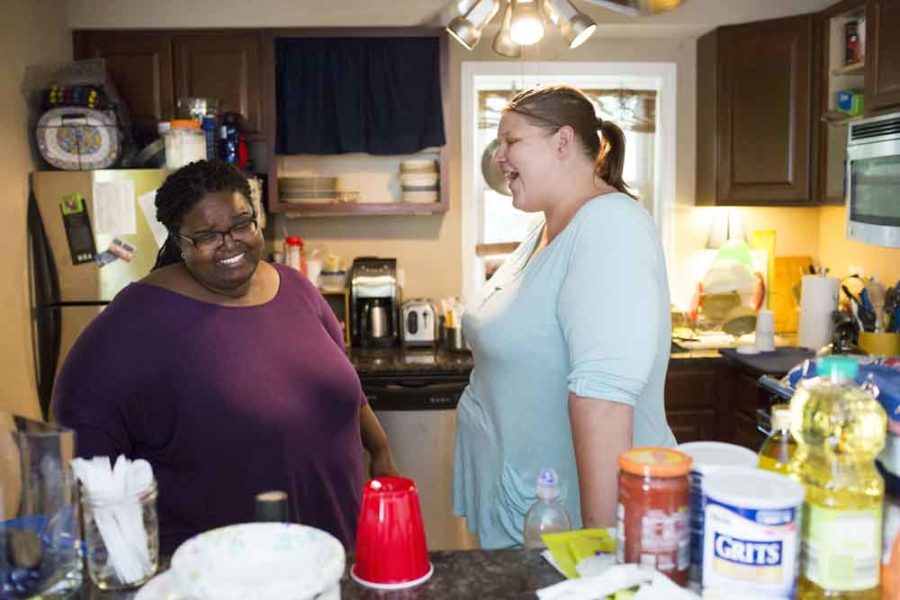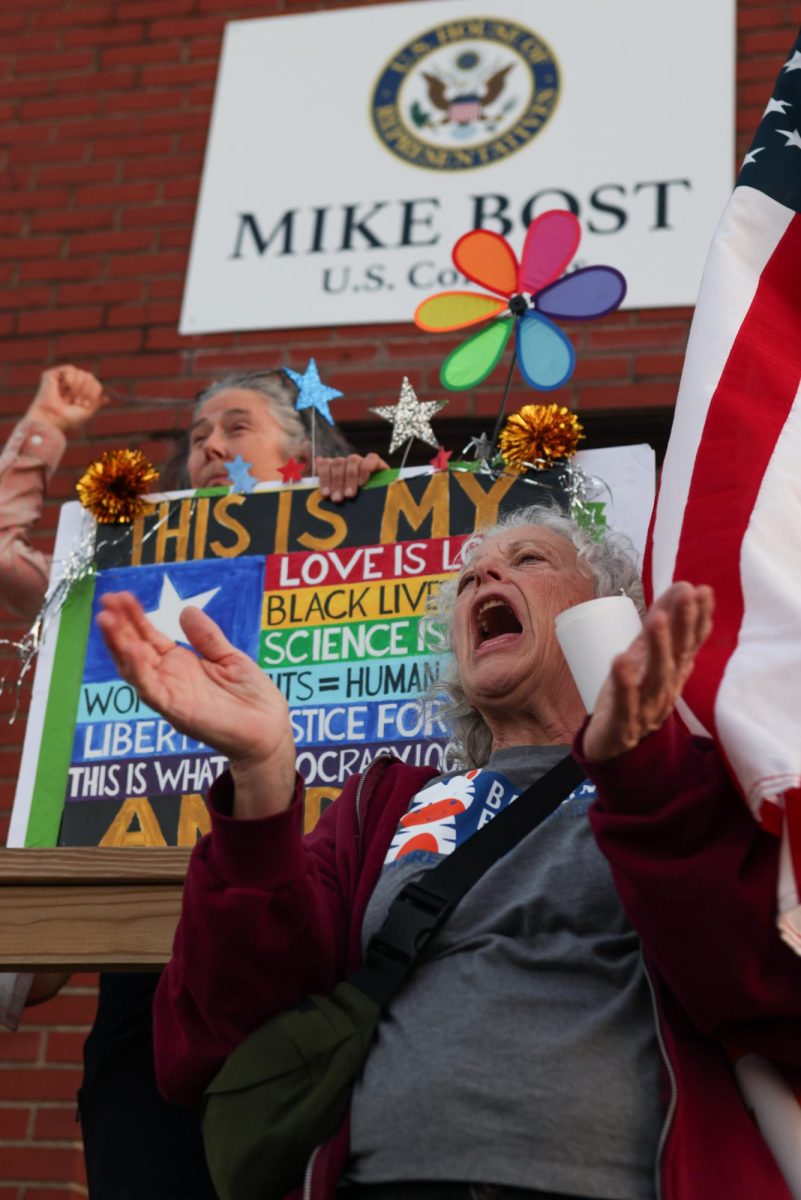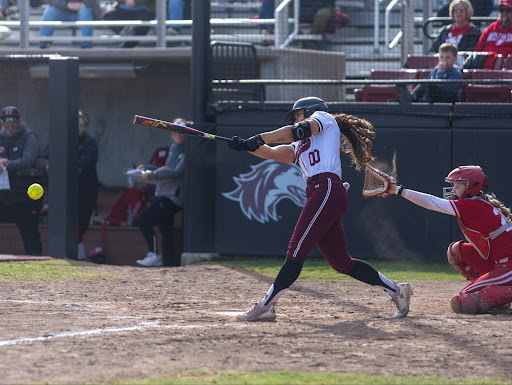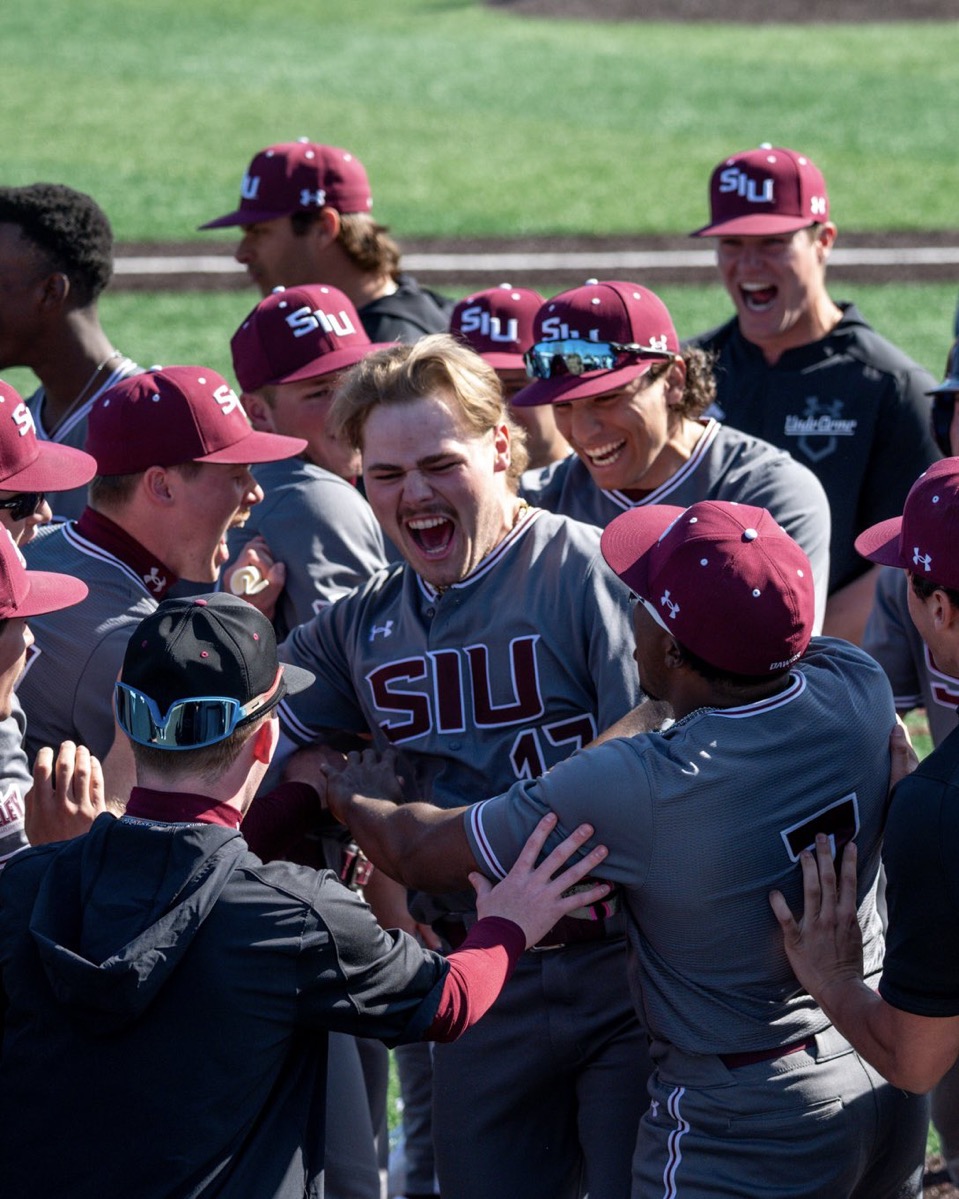Illinois groups encourage more gay couples to adopt children, be foster parents
From left, Dawnn Pirani-Brumfield, 38, and her wife Rachel Pirani-Brumfield, 37, laugh at each other while unpacking groceries in their home Tuesday, July 26, 2016, in Chicago. (Armando L. Sanchez/Chicago Tribune/TNS)
August 24, 2016
CHICAGO — With same-sex marriage widely accepted a year after it was legalized by the Supreme Court, some community groups are hoping less rigid attitudes will prompt more gay and lesbian couples to consider fostering or adopting a child.
“Across the country and especially in Illinois, we just don’t have enough people who have stepped forward, and we think that in the [LGBT] community there are people who would be good parents,” said Susan McConnell, founder and director of Let It Be Us, a local nonprofit adoption and foster care advocacy group. Let It Be Us and other adoption and foster agencies have joined forces with the Illinois Department of Children and Family Services to hold workshops that provide encouragement and advice to potential gay and lesbian parents.
There are 17,019 children in foster care in Illinois — about 6,100 of those children are being cared for by people who are not relatives. And on any given day, about 1,000 children are available for adoption, according to DCFS.
Advertisement
Dawnn Pirani-Brumfield, 38, and her wife, Rachel, 37, of South Deering, Ill., are in the process of adopting 13-year-old Alicia, who describes herself as gender nonconforming. “When she came in, she just thought it was the best thing ever that we were married and we were same gender and she felt that she was going to be safer with us in her own gender expression and sexuality,” Rachel Pirani-Brumfield said.
Rachel Pirani-Brumfield also splits custody of her biological daughter, Zosia, 17, with her ex-husband, and she and Dawnn Pirani-Brumfield hope to adopt more children — specifically LGBT youth. The couple took the first step toward fostering another child in a recent meeting, Dawnn Pirani-Brumfield said.
Although LGBT people make up 2 to 4 percent of the U.S. adult population, Andrew Flores, a public opinion and policy fellow at the Williams Institute, said same-sex couples are about six times more likely to raise foster youth and four times more likely to raise adopted youth than heterosexual couples.
The Williams Institute is a UCLA-based think tank focused on sexual orientation and gender identity research. And with nearly 415,000 children in the U.S. foster care system, more help is needed.
“It seems as though same-sex couples are a population that are already more likely to parent through these mechanisms,” Flores said. “So, it is quite important to reach out to members of this group to raise children who otherwise might not have placement.”
Kim Hunt, executive director of the Pride Action Tank, an LGBT think tank supported by the AIDS Foundation of Chicago, said seminars encouraging LGBT adults to adopt is only one piece of the puzzle.
“The other piece for us is finding homes for LGBT older children in the child welfare system,” Hunt said. “They are often the hardest to place because of prospective parents’ biases when it comes to gender identity and sexual orientation.”
Advertisement*
LGBT adolescents make up as much as 40 percent of homeless youth, according to the Administration of Children and Families, a division of the U.S. Department of Health and Human Services.
Mark Wilson knows firsthand how important it is to get LGBT families involved in child care. The 47-year-old Oak Park resident has been a foster father to straight and gay children for more than a decade. He and his husband, Bryan Northup, 42, have been married since 2013 and are currently fostering two small children. Their oldest foster child is 30.
Having gay parents can be invaluable for children questioning their own sexuality and gender identity, Wilson said. Foster agency representatives may see certain traits as negatives that a potential gay parent wouldn’t consider a problem.
“Being able to take the gay, lesbian, transgender issues and set those aside could be a really wonderful thing for a kid who might feel like they’re worthless because of who they are,” he said.
As many as 2 million to 3.7 million U.S. children under 18 are estimated to have had a lesbian, gay, bisexual or transgender parent, and about 200,000 were being raised by same-sex couples as of fall 2015, according to the Williams Institute. The perception of LGBT people as parents has improved over the years, Wilson said, but there are still the occasional double takes and uncomfortable questions.
“We have experienced in the school system where we kind of have to explain that we understand as much as the soccer mom sitting next to us,” Wilson said. “There is definitely something to be said about how doctors and educators interact with us. I don’t necessarily think it’s because we’re gay, I think it’s because they’re used to seeing moms doing what we’re doing. … It’s kind of a stereotype that if dad’s helping with parenting, he’s ‘baby-sitting,’ which I believe is nonsense.”
The Pirani-Brumfields also encountered a problem with doctor visits. In one instance, health clinic officials would not allow Zosia to be seen by a doctor because she was accompanied by Rachel Pirani-Brumfield, even though she is Zosia’s biological mother. Zosia is under Dawnn Pirani-Brumfield’s insurance. Rachel Pirani-Brumfield said her ex-husband’s wife has taken Zosia to doctor appointments with no issues.
“I am convinced that a situation like that would not happen if we were a heterosexual couple,” she said. “It’s like they make allowances for heterosexual couples that they would not make for same-gender couples, and that’s a little disturbing,” Dawnn Pirani-Brumfield said. Although her multiracial female-run family is “quite average,” Rachel Pirani-Brumfield said she still worries occasionally when they are in public together.
“We have to think about to whom we can disclose that we are in a same-gender relationship … there’s a sense of ‘how safe are we in any given situation?’ ” she said. “If you want to talk about the current climate of the country, being a same-gender, interracial couple is kind of the worst thing we can possibly be and expect to be safe in our daily lives.”
Currey Cook, an attorney for Lambda Legal, one of the nation’s oldest nonprofit law firms that advocates for LGBT rights, said the fight for equality has made progress but is far from over.
“It’s not that the [Supreme Court] resolved everything as far as parenting for same-sex couples, but it did clarify that under the law that all same-sex couples that are married should be treated equally,” he said. “We’re not seeing that fully realized in every state in every aspect, but it’s certainly getting there.”
Illinois’ laws and practices concerning same-sex couples are more progressive than many other states, but there are still stumbling blocks. These range, for example, from who can sign a birth certificate in cases of artificial insemination to parents’ rights for unwedded couples, Cook said.
Despite the nuanced legal battles, Flores said public approval of same-sex adoption is steadily growing.
“Acceptance of LGBTQ parenthood appears to be far greater now than 20 years ago,” Flores said. “What some people have failed to realize is that acceptance of adoption rights has exceeded approval of marriage equality. It is often discussed how dramatic attitudes toward marriage equality have changed. But adoption and other rights have also seen dramatic and positive shifts.” Flores attributed the change to the simple fact that LGBT people are more open about their sexuality.
“Personally knowing someone who is from the LGBTQ community plays a huge factor in the growing understanding and acceptance of LGBTQ people and rights affecting that community,” he said. “The percent of people who report personally knowing someone who is LGBTQ is about 75 percent. There exist other explanations, such as representing LGBTQ people in movies and television shows.”
All of this has led to foster and adoption agencies — faith-based and secular — from around the state turning to the gay, transgender and lesbian population to help reduce the number of children without a home or family.
More than 100 people showed up at the first workshop last month where potential parents were paired with agencies to begin the fostering process, said Renee Lehocky, director of strategic initiatives for Lawrence Hall, a 150-year-old nonprofit and one of the participating foster foundations. The next workshop is slated for October.
Wilson said regardless of whether the child or parent is LGBT, parenting simply comes down to how you relate and talk to your kid.
“The conversations that we have that are very specific to teen conversations — like making sure that he knows how to use a condom if he’s sexually active — you know that’s universal whether they’re straight or not. Helping him understand that whoever he is going to be dating that he treats them respectfully,” Wilson said. “Basically teaching him how to be a decent person doesn’t have anything to do with being gay or straight.”
___
(c)2016 Chicago Tribune
Visit the Chicago Tribune at www.chicagotribune.com
Distributed by Tribune Content Agency, LLC.
Advertisement










